 Petzlover
Petzlover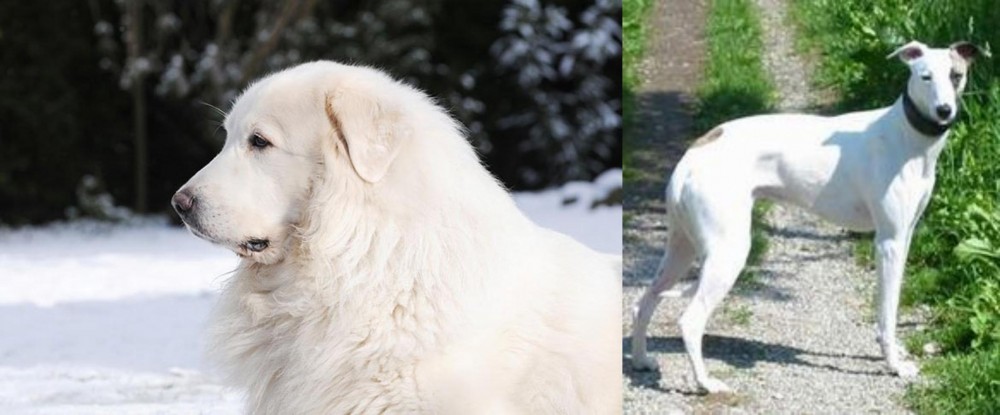 Great Pyrenees is originated from France but Kaikadi is originated from India. Great Pyrenees may grow 37 cm / 15 inches higher than Kaikadi. Great Pyrenees may weigh 33 kg / 73 pounds more than Kaikadi. Both Great Pyrenees and Kaikadi has almost same life span. Great Pyrenees may have more litter size than Kaikadi. Great Pyrenees requires Moderate Maintenance. But Kaikadi requires Low Maintenance
Great Pyrenees is originated from France but Kaikadi is originated from India. Great Pyrenees may grow 37 cm / 15 inches higher than Kaikadi. Great Pyrenees may weigh 33 kg / 73 pounds more than Kaikadi. Both Great Pyrenees and Kaikadi has almost same life span. Great Pyrenees may have more litter size than Kaikadi. Great Pyrenees requires Moderate Maintenance. But Kaikadi requires Low Maintenance
 The Great Pyrenees could be from Spain or France because the dog hails from the Pyrenees Mountains, which spans both France and Spain.
The Great Pyrenees could be from Spain or France because the dog hails from the Pyrenees Mountains, which spans both France and Spain.
The dog was used to defend flocks from predators but its lineage goes a long way back, thousands of years in fact. It is thought that they only arrived in Europe about 5,000 years ago. The dog was adopted into the court of Louis the XIV as a royal dog.
During the mid 1600s, the dog's numbers dwindled but the French developed kennel clubs where the dog could be bred and its numbers restored. It was in 1933 that the Great Pyrenees received American Kennel Club recognition.
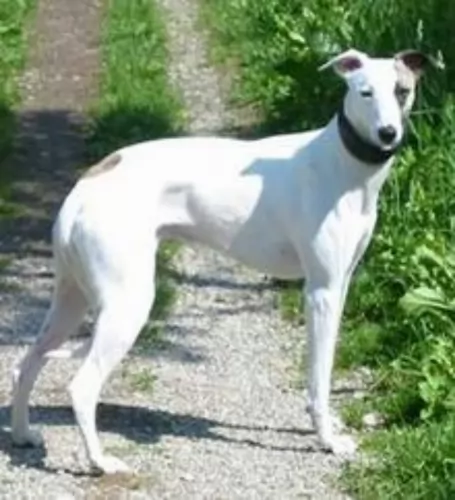 The Kaikadi or Kai Kadi is a terrier dog, hailing from India. Not much is available on the history of the dog, but today you won't easily find original Kai Kadi in India. This is because they have essentially been mixed with stray dogs of India as well as Pariah.
The Kaikadi or Kai Kadi is a terrier dog, hailing from India. Not much is available on the history of the dog, but today you won't easily find original Kai Kadi in India. This is because they have essentially been mixed with stray dogs of India as well as Pariah.
It is for this reason that the dog isn't recognized as a standardized breed by any of the leading kennel clubs.
 This is a beautiful dog, noticeable by the essentially white coat and his overall size, standing at 70 to 82cm and weighing between 40 to 54 kg.
This is a beautiful dog, noticeable by the essentially white coat and his overall size, standing at 70 to 82cm and weighing between 40 to 54 kg.
The double coat is medium to long, coarse and straight or wavy and and it can be solid white, cream or white with patches of light tan or grey.
The nose is black, the eyes brown, the ears of medium length and floppy and the tail long and plumed.
The Great Pyrenees is an intelligent, strong willed dog with a mind of his own so he will be able to be trained and socialized successfully.
His huge size will require that he be trained because when he is indoors he can knock things over and he must be able to respond to you telling him to lie down.
As a large dog, he isn’t suited for tiny homes, as he requires lots of space even though he doesn’t require a lot of exercise. Not only that, he takes his watchdog duties seriously and he is inclined to bark a lot, and in a small place, you’ll be getting constant complaints from the neighbors.
When trained and socialized, your big dog is social, active and loving. He gets on well with children, the elderly and with pets in the home. He isn’t that overly active and will happily make himself at home on your couch and bed.
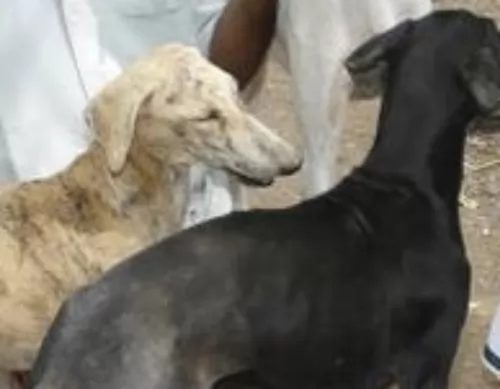 These dog have always been used for hunting, guarding and herding in India and today he makes a good watchdog, watching over his human family.
These dog have always been used for hunting, guarding and herding in India and today he makes a good watchdog, watching over his human family.
It's not a large dog though and he stands at roughly 35 to 45cm in height and weighs 17 to 21kg. He is lean and muscular, looking similar to the Italian Greyhound or Whippet.
He has a short smooth coat and the color can be patterned white, tan and black. The head is long and thin, as are the legs, and his tail is long and thin too. The floppy ears stand erect when alert.
The Kaikadi is an affectionate, alert, energetic dog. He won't do well in a city environment with a tiny garden as he requires a large garden to run in.
He is a dog that will need to be trained and socialized if you want him to be obedient and to get on well with children in the home as well as pets.
He can be a fairly quiet, docile dog inside but outside when there is a game to be had, he becomes lively and animated. They are quite sensitive, so while they get on well with children in the home, he won’t respond well to large families with lots of rowdy, undisciplined children as it makes him anxious.
 The Great Pyrenees is such a calm, independent, serious, well-mannered dog who loves to be around his human family and to please them. He is gentle and knows how to behave well around children, the elderly as well as with any pets in the home.
The Great Pyrenees is such a calm, independent, serious, well-mannered dog who loves to be around his human family and to please them. He is gentle and knows how to behave well around children, the elderly as well as with any pets in the home.
He makes a wonderful companion and although he loves indoor life as much as outdoor life, he is much happier settling into life in the country or the suburbs as opposed to life in the city and a tiny property.
Give your big white coated pet all the love he thrives on, and you'll enjoy a wonderful relationship with this large, amicable dog.
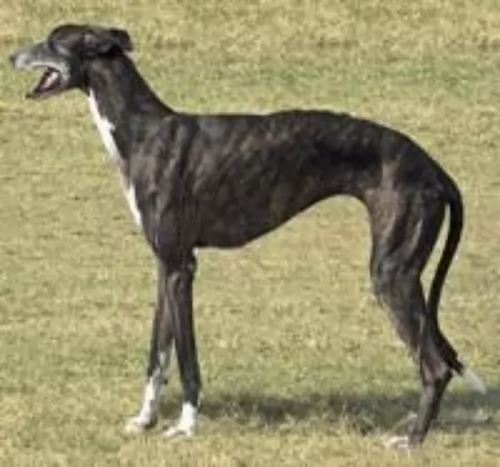 Your Kai Kadi loves running and playing outside, after all he has always been a hunting dog. He will love to spend time with you outside playing.
Your Kai Kadi loves running and playing outside, after all he has always been a hunting dog. He will love to spend time with you outside playing.
The Kaikadi is a low maintenance dog too. Provide your Kaikadi with everything that makes a dog happy and in exchange you’ll get yourself a loyal, loving pet who wants to be your friend.
 Your Great Pyrenees is a big dog with an average lifespan of 10 to 12 years. His large size means you will need to look out for typical 'big dog' ailments such as hip dysplasia.
Your Great Pyrenees is a big dog with an average lifespan of 10 to 12 years. His large size means you will need to look out for typical 'big dog' ailments such as hip dysplasia.
This problem can cause your pet to be in pain and he can also become lame, battling to walk and play and battling to get up after lying down.
Also, look out for bone cancer with your pet and as mentioned previously, bloat, which is a life threatening disease where the stomach of the dog swells up.
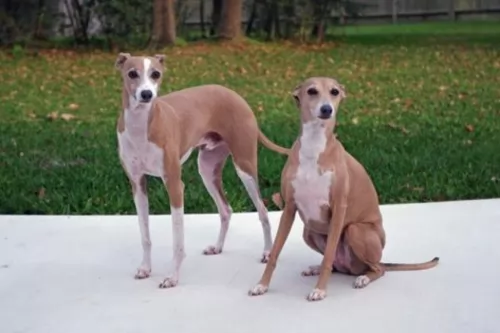 When you’ve got a Kai Kadi, make sure you understand some of the health risks that come along. This is a healthy dog breed so you’re not likely to have much going wrong with him, but you need to know that he can get sick and then you need to have the name of a good vet for medical treatment -
When you’ve got a Kai Kadi, make sure you understand some of the health risks that come along. This is a healthy dog breed so you’re not likely to have much going wrong with him, but you need to know that he can get sick and then you need to have the name of a good vet for medical treatment -
A sudden drop in blood sugar, which is many times brought on by stress, can make your dog lethargic and even have slight tremors in the face. It could be a hypoglycemic attack. See the vet immediately.
The pancreatitis can become inflamed and your dog could be vomiting, have diarrhea and have abdominal pain. There are quite a few things that can cause pancreatitis such as obesity, infection as well as stress.
 Your Great Pyrenees isn't going to be a dog leaping around you demanding a game or walk like what you get from some energetic dogs. He certainly doesn't require strenuous exercise but will require a nice, brisk walk every day. Give him some ball or rope games too. He's territorial and likes large grounds to walk around and guard and this constant guarding is a good form of exercise too.
Your Great Pyrenees isn't going to be a dog leaping around you demanding a game or walk like what you get from some energetic dogs. He certainly doesn't require strenuous exercise but will require a nice, brisk walk every day. Give him some ball or rope games too. He's territorial and likes large grounds to walk around and guard and this constant guarding is a good form of exercise too.
With two layers, the coat of the Great Pyrenees will need to be brushed twice a week to prevent burrs attaching to the fur and to prevent it from matting, It also gets rid of loose hair during shedding.
He tends to drool so it's handy keeping a damp cloth close by just to give his face area a wipe down. Your dog's ears will need to be cleaned with special ear-cleaning lotion and his nails will also need to be trimmed.
Socialize your Great Pyrenees with other dogs and people from a young age. Without proper socialization, this breed can become territorial and possessive of his family, which could lead to aggression. He bonds with his family but tends to be wary of strangers.
It is far better to feed your Great Pyrenees smaller meals throughout the day as opposed to 2 large meals a day. A large dog like him can develop bloat from gulping down a large amount of food too quickly.
If you feed your Great Pyrenees commercially manufactured food, make sure it is high in omega 3 and 6 to keep his thick white coat luxurious.
Your dog will need a dog food targeted at a large breed. Remember to include some raw meat as well as cooked chicken, vegetables and brown rice into his kibble and always ensure fresh, cool water is available.
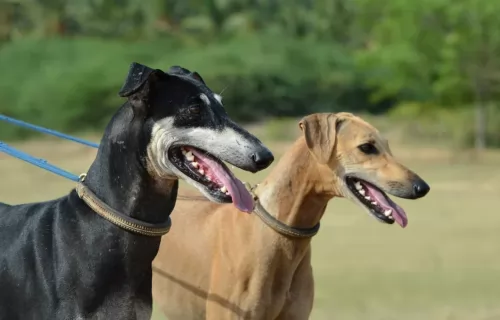 Owning a dog is a responsibility, requiring you to look after a living being just like you would any family member of yours, otherwise why get a dog in the first place?
Owning a dog is a responsibility, requiring you to look after a living being just like you would any family member of yours, otherwise why get a dog in the first place?
You may want a dog for watchdog purposes, but as a living creature, it is important to develop a relationship with your pet and to show him that you love and appreciate him.
There are many things to do to ensure you have a healthy, happy 4-legged canine member in your household
Make sure he has fresh, cool water available to him around the clock.
Provide him with a warm, dry place to sleep.
Provide him with wholesome food to maintain health. There are many excellent commercially manufactured foods on the market. Buy one according to the size and energy levels of your pet. Try to sometimes add cooked home-made food into his kibble such as cooked chicken, brown rice and vegetables as well as some raw meat from time to time. This diet is guaranteed to keep your pet mentally and physically well.
Check your pets nails, ears and eyes regularly. He should be checked for fleas and ticks when you brush him twice a week. Have him examined by a veterinarian as soon as you suspect something is amiss with him. Keep him up to date with his vaccinations.
The Kaikadi is an energetic dog so make sure that you provide him with the opportunity to be exercised. Take him on walks or hikes, play ball and rope games with him and go swimming with him to ensure he remains lean and muscular.
Have him trained and socialized as it takes off the rough-edges of a dog.